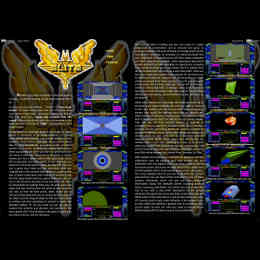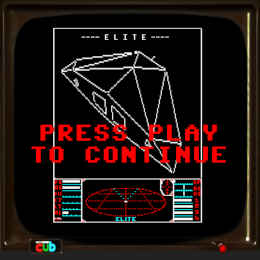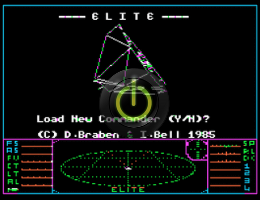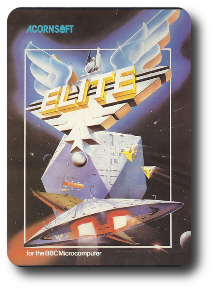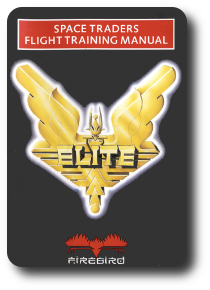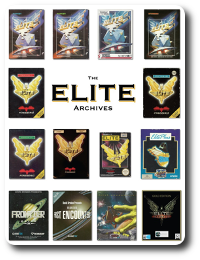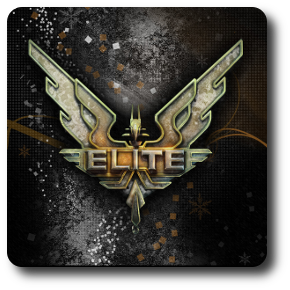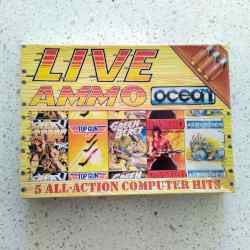Elite space trading game
Updated 4 July 2023

Welcome aboard this Cobra Mk III trading and combat craft. The ship has been supplied to you by Faulcon deLacy Spaceways, by arrangement with the Galactic Co-operative of Worlds whose Space and Interstellar Pilot's Exams you have just successfully completed. The small flight manual supplied with the craft is designed to familiarize you with all aspects of space flight, combat and trading, and we hope that it will be of use to you.
Introducing the Elite franchise
The Game Franchise Elite has a solid following in the 8-bit gaming world. The original Elite game released in 1984 on the on the BBC Micro was probably the first game to be a space opera in a sandbox. The game seamlessly blends trading, space combat and deep space exploration. As we have been working through my archives we have realized how much great information there is on Elite. Royal Mail even released a video game stamp collection that featured the 1984 release of Elite. This is my journal of the game.
The popularity and critical reception of a game can be influenced by many factors such as graphics, gameplay, story, innovation, and cultural impact. Elite was considered a groundbreaking game in the space trading and combat simulation genre, with its open-world design, procedurally generated galaxies, and 3D graphics. It offered players the freedom to explore and make choices, making the game highly replayable.
The scope of the space trading game Elite and its subsequent versions is an amazing feat for the hardware available. The Beeb (BBC microcomputer) version of Elite fit into 22 kilobytes of memory. In order to achieve this increadable feat of software engineering, the developers used Fibonnacci sequences to calculate the scope of the universe.
Known ports for the game include:
IBM MS-DOS, Acorn 32-bit, Amiga, Amstrad CPC, Apple II, Atari ST, BBC Micro,
Commodore 64, MSX, NES, Tatung Einstein, ZX Spectrum
Catalog of Elite Spaceships

In the game Elite, a renowned space trading and combat simulation, players have the opportunity to pilot various types of space ships as they navigate through a vast and dynamic universe. These ships come in different sizes, classes, and with unique capabilities, allowing players to tailor their gameplay experience to their preferred playstyle. Here are some of the notable types of space ships you can encounter in Elite:
- Sidewinder: The starting ship for new players, the Sidewinder is a small and agile vessel suitable for basic trading and combat missions. It offers a good balance between maneuverability and cargo capacity.
- Cobra MkIII: A versatile multipurpose ship, the Cobra MkIII is a fan-favorite choice for traders, explorers, and bounty hunters. It has decent cargo space, good speed, and can be upgraded with various modules for different tasks.
- Anaconda: As one of the largest and most expensive ships in the game, the Anaconda is a behemoth designed for long-range exploration or heavy combat. It boasts impressive firepower, extensive cargo capacity, and excellent jump range.
- Imperial Cutter: This luxurious vessel is favored by those aligned with the Empire faction. It combines elegance with formidable combat capabilities and substantial cargo space, making it an excellent choice for traders and combat-oriented players.
- Federal Corvette: The Federal Corvette is a powerful warship used by the Federation faction. It excels in combat situations, with a wide range of hardpoints and strong defenses. It may not have as much cargo space as other ships, but it packs a punch in battles.
- Asp Explorer: A popular choice for explorers, the Asp Explorer offers a perfect balance between jump range, module capacity, and fuel efficiency. Its sleek design and range of optional modules make it an ideal vessel for long-distance exploration missions.
These are just a few examples of the diverse range of space ships available in Elite. Each ship has its strengths, weaknesses, and specialized roles, allowing players to carve their path in the galaxy as traders, pirates, explorers, or mercenaries. The choice of ship in Elite is crucial as it determines your capabilities and playstyle in the vast and immersive world of space exploration and commerce.
Elite Inspired Fiction
Elite release schedule
- 1984 Elite (BBC Micro)
- 1985 Elite (ZX Spectrum, C64)
- 1986 Elite (Apple II)
- 1987 Elite (PC)
- 1988 Elite (Commodore Amiga)
- 1991 Elite Frontier (PC)
- 1995 Elite III First Encounters
- 2015 Elite Dangerous (PC/Steam)




